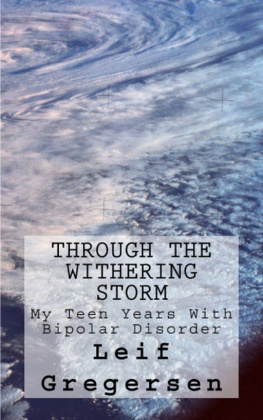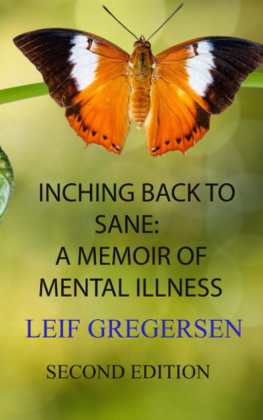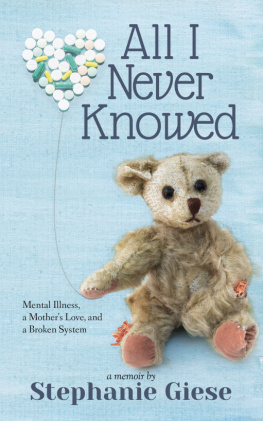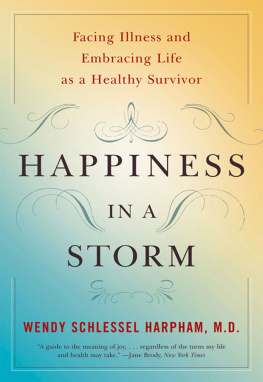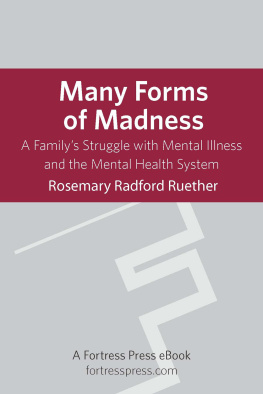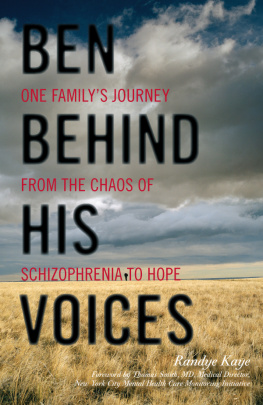Through the Withering Storm:
A Brief History of a Mental Illness
Leif Gregersen
Copyright 2009 by Leif Gregersen
All Rights Reserved.
Foreword by Dr.Brian Bishop
Edited by Raevn Brasch and Nancy Argyle.
www.edmontonwriter.com
Read my growing list of books and
eBooks on nearly all eBook platforms
-Leif Gregersen
Foreword
As a psychiatrist, I am privileged to begiven a very personal window into my patients lives. They trust meand talk about things that they cannot discuss with others.Patients with mental illness, however, are first and foremost,people. Their illnesses may be similar but their personalexperiences are all very different. Their experiences are uniquebecause every human brain is unique and it is the brain thatdetermines who we are. Every idea, feeling, decision and action isdetermined by the delicate machinery that we balance daily on ourshoulders without a thought. Mental illnesses happen to people andthey dont happen to someone else they happen to us. About onein five of us will suffer a mental illness in our lives and so allof us have known somebody with a mental illness, if not ourselves,then someone we work with or meet, on a bus, in a car, in the bankor on the street. Although these illnesses are common, we do notusually talk about them much. No one chooses to be ill and thereare no good illnesses. They all interfere with our lives. Theneurological disorders, particularly the ones we call mentalillnesses, are especially disruptive because, when the delicatemachinery of our brain goes wrong, so do we.
Mental illnesses affect individuals, theirfamilies, and everyone around them but the costs are not just tolives, careers and families. The social and economic impacts ofmental illnesses are slowly being recognized in business, in thearmed forces, in our health care system as well as in daily life.Most of these common and very personal situations do not makenewspaper headlines. They are private struggles to try to makesense of what may seem an alien, confusing and sometimes hostileworld.
Leif has bravely chosen to share his ownprivate struggles during his life and his experience with his ownillness. He has given us all the unusual opportunity to share hispersonal and continuing story.
It is opportune at this time, when somegovernments see illnesses only in terms of dollars and haveforgotten that it is people who get sick, that someone has thecourage to make us realize that this is personal. People are hurtby illness and our governments should not be adding to thesuffering.
Thank you, Leif, for allowing me theprivilege of writing an introduction and for your contribution tothe ongoing efforts to remove taboos and ignorance about mentalillness.
Dr. Brian Bishop, December, 2009
Chapter One
The Last Glorious Summer
It was the middle of August 1985 and it wasthe last of the long and glorious summers I was to have as a kid.For two months, we could laze around, drink tall iced sodas, playwith whatever friends we had and generally forget about all theturmoil in the world and the years of work we would have to dobefore we would finally reach the point where we were finishedschool and standing tall as fully institutionalized youngpeople.
It stillstands out clearly in my mind what those summers meant. They werethe icing on a birthday cake, they were the oases in the vastdesert of being told where to go, what to do and how hard to climb.From September on, I would often look at the calendar or the slowlyticking clock and count the days, the hours, the minutes, untilsummer would come around again. Summer meant trips to the cool and beautiful mountains andthe hot and fascinating Badlands of the Drumheller Valley where myfavorite uncle lived, and even longer journeys to the interior ofBritish Columbia where the sunshine and the fresh apples made itseem like you were in the Garden of Eden. Those trips meanteverything to me. Probably not so much in 1985, but, in earlieryears, I can recall that weekends were so precious that I wouldoccasionally be moved to tears on Sunday night knowing I had to goback and face school for five days until another weekend camearound. Always in the back of my mind there was the idea that oneday when school was over and I could go where I wanted, I couldspend all my time in these beautiful and loving places, far fromteachers and bullies and the many things that nearly made lifeunbearable for me as a child.
It was sad, really because I stuck out inschool, having a short haircut when no one else did, and I didntoften care much about my clothes or my general appearance. I likedto read and do well on tests. I didnt like rock and roll music orplay sports outside of the pick-up games of football I used to getinvolved in. Even then though I was always the last picked for theteam and had to do twice as good as anyone just to get the ballthrown to me. In short, I was a misfit, a nerd.
Fortunately, a year earlier from this timeand place I was in, I found a place where the things I likedmattered, where people approached life a little more seriously,where there was a lot more fun to be had than there ever was atschool and I was even able to make a few friends. I found AirCadets. Joining up was really my moms idea, although my dad workedwith Air Cadets through the local Lions Club. Air Cadets convenedevery Monday evening (sports night) and Thursday evening (paradenight). We often went for weekend camps and there were longer campscalled courses that many of us would attend in the summer.
Late in the summer of 1985, I was about toattend such a course known only as basic training at a place calledCanadian Forces Base Penhold. Penhold was a former Second World Warera airmens training base not far from Red Deer, Alberta, wheremany courses took place. It remains a cadet training camp to thisday, but has been slightly converted so that it is also a jail/bootcamp for troubled kids. Sometimes I laugh when I think of thisplace being used for punishment and correction because, back then,everyone I knew was there voluntarily and loved just about everyminute of it. There were band camps, flying scholarship camps,junior leaders camps and of course, basic training. Basictraining, for me, would be two weeks of instruction in drill,physical fitness, leadership, survival, and anything else theycould cram into two weeks of eight-hour-days for 13-year-olds.
The day I remember most clearly, though, isthe one just before camp. I had gotten myself into a bit of troublewith my brother Owen. He was a weight trainer and often liked tolounge around without a shirt on. There was something about thishabit of his that irritated me, so, as I was ironing my uniformthat day in preparation for camp, I snuck up behind him, and,honestly thinking it would have the same effect of something verycold (making the person jump) I took the very hot iron and touchedit to his back. He didnt just jump, he screamed, and then screamedblue bloody murder about what he was going to do to me. I took offlike a shot, but he was close behind me, and the only thing thatkept me from getting a beating was the fact that I held the ironout in front of myself, promising that it would bite twice if hewere to hit me.
I made good my escape as he went to attend tohis wound (there is still a mark on his back to this day and heshows it to me often). I decided to avoid him at all costs until Ileft for camp. By some stroke of luck, I was able to do this,mostly due to my kind sister Kiersten, who, despite her four-yearhead start on me, never complained when I wanted to hang out withher and her friends.
My brother Owen, on the other hand, used todo things like use code words with his friends when they wanted toditch me. I would be standing with them and suddenly one of themwould yell three! or four!, which was a pre-arranged place tomeet and they would run off in different directions leaving mestanding there alone and sad that I had no friends or youngerbrothers.

